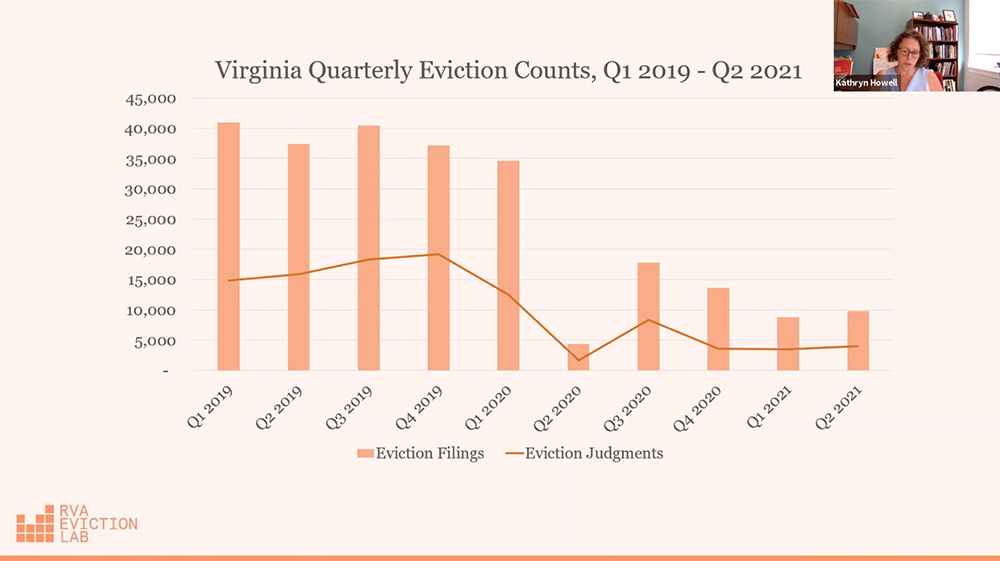News
RVA Eviction Lab co-founder discusses ongoing research amid pandemic

By David Slipher
In 2018, The New York Times reported that Virginia had five of the top 10 evicting cities in the country, with Richmond holding the No. 2 spot. Despite the efforts of local and state governments to address eviction issues, there was not enough data to make sense of the situation.
“And that really jogged people to say, ‘there’s something going on here, and it was very mobilizing,” said Kathryn Howell, Ph.D., an associate professor at the L. Douglas Wilder School of Government and Public Affairs at Virginia Commonwealth University.
Later that year, Howell and her colleague Benjamin Teresa, Ph.D., an assistant professor at the Wilder School, formed the RVA Eviction Lab. Together, they compile and analyze long-range data on evictions in Virginia. In response to community needs, the grant-funded lab works with local organizations, advocacy groups, government agencies and elected officials to inform trends and develop solutions to combat eviction.
On Sept. 22, Howell discussed the lab’s ongoing research during the COVID-19 pandemic and fielded questions from the audience at the Wilder School’s monthly Lunch and Learn series. Her presentation and discussion, “Eviction Across the Commonwealth: What You Need to Know,” is available for viewing on YouTube.
Understanding evictions during the pandemic
One of the most influential factors contributing to neighborhood eviction rate is race (nonwhite), more than double all other factors analyzed, Howell said at the Wilder School event. Other structural factors such as poverty, unemployment, health disparities and historical community divestment also play a role in eviction rates. Virginia also sees higher rates of eviction than other states because there are fewer renter protections and the cost to file evictions is significantly lower. Because of this, more evictions are done legally, which leads to more visible and reportable numbers.
During 2020, Virginia experienced an overall decrease in evictions, thanks to federal protections like the eviction moratorium from the Centers for Disease Control and Prevention and the CARES Act. Also, Virginia courts were closed during the second quarter of 2020. Rent relief picked up at the end of 2020, and Virginia began some of the nation’s first rent relief programs. Because of mobilization and advocacy at the community levels, Virginia was primed to act. The state also benefited from healthy use of renter relief funds, spending down more of its federal money than other states, according to Howell.
“For me, there is not an acceptable level of eviction,” said Howell.
In addition to federal programs, Virginia has created eviction diversion and reduction programs, rental assistance, and dedicated funds for tenants facing eviction, Howell said. In partnership with businesses and philanthropic organizations, the state also developed legal assistance funds for those facing housing instability. These programs — which came about in community response to historically high eviction rates — have helped diminish worse widespread economic devastation. As Howell puts it, “it’s easier to do rent relief than to have people go into homelessness.”
Lessons learned and looking forward
Despite 2020’s eviction decline, more than a quarter of Virginia renters are not confident in their ability to pay the next month’s rent. Howell’s research also observes a slow rising of evictions and pending evictions now that the federal eviction moratorium has expired. Rent relief per household has also continued to grow, with the average household behind more than five months.
“One of the big lessons is that we really have to think structurally,” Howell said. “We can’t just sort of keep doing these kind of short spurt things saying, ‘we fixed it this time.’ Because we aren’t actually fixing it, we’re putting a Band-Aid over something that’s a whole body experience.”
Howell, though, feels optimistic about future eviction policies, given that the pandemic has illuminated a continued need for policy reform. In her mind, overcoming the eviction crisis in Virginia and beyond will require understanding societal challenges and thinking bigger and deeper to transform perspectives.
“For me, there is not an acceptable level of eviction,” she said.